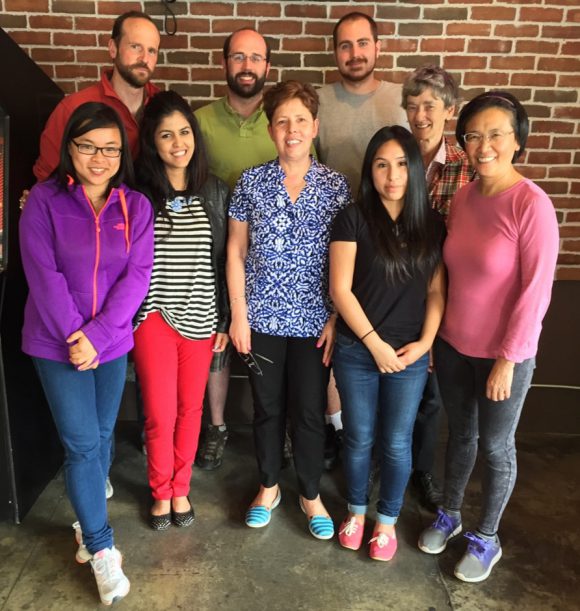
The Tumer Lab. Back row left to right: John McLaughlin, research associate; Matthew Butterly, part time technician; Daniel Finn (SEBS’16); Jennifer Nielsen Kahn, part time technician. Front row left to right: Yijun Zhou, graduate student; Debaleena Basu, graduate student (SEBS’16); Nilgun Tumer, distinguished professor; Helen Lopez, graduate student (SEBS’16); Xiaoping- Ping Li, research professor.
Distinguished professor Nilgun Tumer, Department of Plant Biology, has received a grant for $2,182,115 from the National Institute for Health for her project titled “Inhibitors targeting ribosome interactions of ricin.” The grant covers a five year period for the project which targets toxin-specific and unique steps in the ricin intoxication pathway to identify inhibitors that impede the activity of ricin toxin.
Due to its high toxicity, ricin is an attractive tool for bioterrorism and for targeted therapy for cancer. Tumer’s laboratory has been studying the basic mechanism of toxicity of ricin and Shiga toxins (Stxs), as well as a trichothecene mycotoxins.
Shiga toxins (Stxs) produced by Shigella and E. coli O157:H7 (STEC) cause food-borne outbreaks and are major concerns for public health. Ricin intoxication causes serious and sometimes fatal effects. There is no proven safe treatment for ricin intoxication or infection by Shiga toxin producing E. coli.
In the new NIH grant, Dr. Tumer will use fragment-based lead discovery (FBLD) with surface plasmon resonance (SPR) to discover inhibitors of ricin. Dr. Tumer will collaborate with scientists at Albert Einstein University to solve the structure of RTA/inhibitor complexes and with chemists at Rutgers Translational Sciences to optimize the identified fragment hits. The Tumer lab will use their insights into structure function analysis of ricin to identify inhibitors that will reveal previously unidentified toxin-ribosome binding mechanisms and can be used as new leads for future therapeutic design.

Distinguished professor Nilgun Tumer, Department of Plant Biology.
Dr. Nilgun Tumer is a Distinguished Professor in the Department of Plant Biology at SEBS. She trained as an American Cancer Society Fellow at the University of Chicago and led a group working on virus resistance at Monsanto Company before joining Rutgers in 1992. The major focus of her laboratory is to understand the basic mechanism of toxicity of ribosome inactivating proteins (RIPs), such as ricin and Shiga toxins (Stxs) and trichothecene mycotoxins.
Read more about Tumer’s research.

